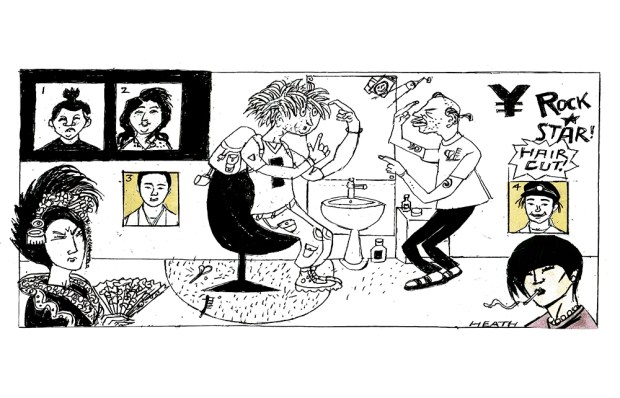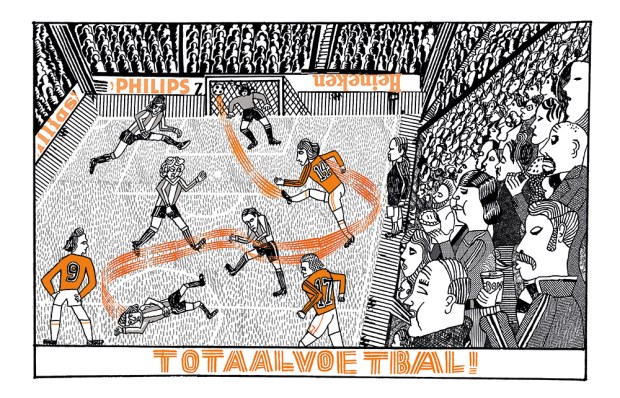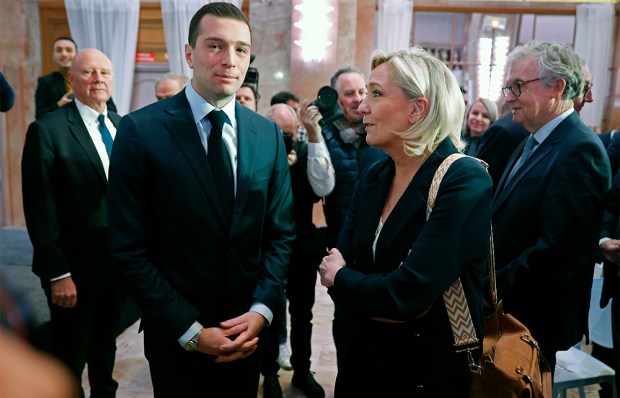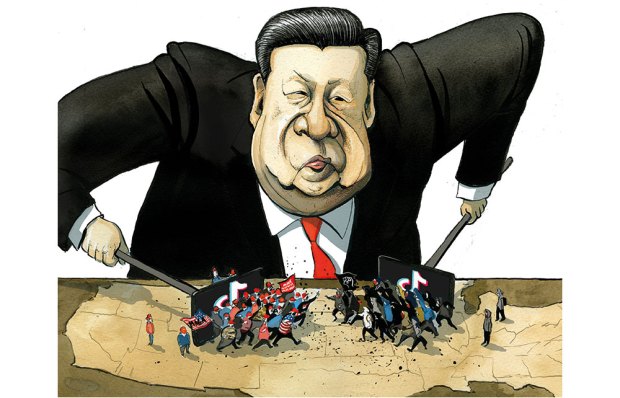It was on a foggy walk to Hell’s Mouth that the sea fret lifted and I looked down, down, down at sea smashing against rocks and yes, it felt like a sign.
I was on a socially distanced hols — if we define ‘socially distanced’ as ‘a bunch of mainly metropolitan friends romping in north Cornwall’ — for my summer of 2020 epiphany, which was this. Of the dozen or so happy, shiny, busy fiftysomethings bodyboarding, yakking and stuffing down Kettle Chips in their wetsuits, only one had what a retired major in Tunbridge Wells might call a job — and that was the books editor of the Oldie. As we gossiped about X, Y and Z (Ms Claudia Fitzherbert of the Oldie has twin sons called Xavier and Yvo, and I have a puppy called Ziggy), this aperçu hit me with the bracing tumble of an Atlantic roller.
We tail-end baby boomers had always assumed that if we wanted it, work was going to sweep us — Thatcher’s children — into our eighties like so many mini-Rupert Murdochs. We would never tire, let alone retire, unless we chose that ‘path’ or made so much money we could never spend it even if we lived for ever.
My peer group — people I had grown up, gone to school or university with, made godparents to my children — had divided. Some were running the country. But by far the majority (and in this group I include myself and Ghislaine Maxwell, who I intersected with briefly at Oxford) were on the cliff edge, and Covid was pushing us over.
I started mentally flipping through my Rolodex and it only proved my hunch. My generation was composed of the great, the good… and the underemployed. Not only was my older brother by 14 months the PM, but many of the citadels were commanded by people I’d known since I was spotty too. The NHS (Simon Stevens), the Royal Opera House (Alex Beard), the Sunday Times (Emma Tucker), the Economist (Zanny Minton-Beddoes), Channel 4 (Ian Katz), the Cabinet Office (Alex Chisholm). I gave up counting when I realised that even the boss of Boots (Sebastian James) and the chair of the UK Covid-19 vaccine taskforce (the turbo-charged Kate Bingham) were exact contemporaries/chums at school or Oxford.
Well done them — proper jobs. Hat tips all round! It takes unbelievable effort and talent to get to the top and stay there. But what concerns us here is the other group — the no-jobs — in the creative industries, telly, publishing, media, advertising, placed on indefinite pause by the pandemic. Before lockdown we all had gigs, we pitched and hustled as per, but basically the Covid curve-ball has acted as an accelerant and we’ve been fast-forwarded into semi-retirement.
Take my pre-lockdown London household. My son Oliver, 23, who works for TalkSport, was the only one of four adults who went out to work at all in the traditional sense of getting on the Tube every morning. Some days — in fact, lots of days — he’d set off for London Bridge leaving us on the sofa in front of the Test match or tennis, and would return to find us with bottoms parked in exactly the same place as before.
The pandemic has done for the media — my weekly show on Sky News seems to have been binned — what it did for high-street retail: it has crunched about ten years of gentle decline into a dizzying four-month fall, during which the Amazon share price hit a peak of $3,000. Everything has changed.
I used to find myself idly worrying about David Cameron. He had left the crease as he attained his half-century. I’d worry about what he would do all day after he had written his door-stopping memoirs (and played tennis, of course).
I might at this point be permitted to mention that I published my own memoir, Rake’s Progress, on 19 March just as all shops shuttered and even Amazon deemed screwball accounts of standing for Euro elections ‘non-Covid essentials’. But this isn’t all about me! This is about my entire generation.
It wasn’t long ago that my gang, with our unisex staycation wear of pre-battered Converse, denims and faded fishermen’s smocks, were pacing ourselves for long innings that stretched into our seventies, the only threat to our sense of continuing utility emanating from long articles about AI and automation in the FT that we assumed wouldn’t affect us anyway. Now, those of us lower down the batting order are unlikely to catch the selector’s eye ever again. We may not be working from home. We may not be working at all.
The new emphasis is on easing out bedblockers in their fifties and sixties from their cushy berths to make room for bushier-tailed millennial jobseekers as 1980s levels of unemployment loom — and on trying to coax reluctant youngsters out of the house again to fill Rishi Sunak’s empty coffers. Which is only right.
As it turned out, many people loved lockdown, especially the well-off, middle-aged middle classes with Ocado, gardens and good broadband. For them, as Christine Ross of Handelsbanken Wealth Management puts it, the past few months became ‘a trial run for retirement’. Folk realised they didn’t need as much money as their financial advisers had warned them they would, and were spending less than they thought. ‘I think the pandemic will accelerate retirement for some, for sure, and if they do lose their jobs, if their entire sector is affected, it’s going to be incredibly difficult to get back in at their level,’ Ross tells me. In other words, ‘This too shall not pass’. This is it. The end.
If the pandemic had struck at the beginning of the last century, when people only lived till about 50, it wouldn’t have affected my cohort as we’d be dead already. Now the rug is being pulled on those born between 1960 and 1970, and we have deserts of vast eternity to fill before we reach pensionable age and death.
When I was little, my brothers and I were fascinated by a picture book by Richard Scarry called What Do People Do All Day? It’s a very pertinent question, and will only become more so. My prediction? We will spend many of our remaining productive years ‘nurturing’ things: tending to our roses, growing vegetables, cooking, family, learning new skills, travel, languages. My brother Leo, for example, a sustainability expert and futurologist, is doing a welding course in his spare time.
Everything — in the garden at least — will be lovely. Really. I’m looking forward. Roll on the next 30 years!
Got something to add? Join the discussion and comment below.
Get 10 issues for just $10
Subscribe to The Spectator Australia today for the next 10 magazine issues, plus full online access, for just $10.
spectator.co.uk/podcast - Rachel Johnson and author and comedian Dominic Frisby on early retirements.
You might disagree with half of it, but you’ll enjoy reading all of it. Try your first month for free, then just $2 a week for the remainder of your first year.














Comments
Don't miss out
Join the conversation with other Spectator Australia readers. Subscribe to leave a comment.
SUBSCRIBEAlready a subscriber? Log in